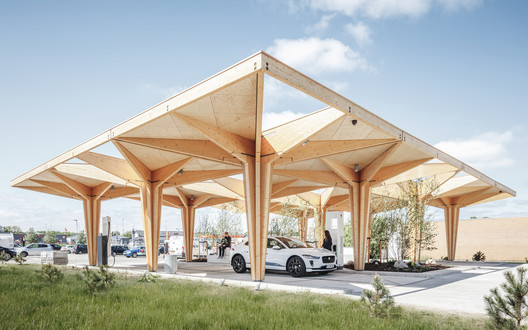The U.S. Department of Transportation said on Tuesday it has approved plans for electric vehicle charging stations for all 50 states, Washington, D.C. and Puerto Rico, which cover about 75,000 miles of highways.
Earlier this year, the Biden administration allocated $5 billion to states to fund EV chargers along highways for five years as part of its two-tier infrastructure package. Under the plan, titled the National Electric Vehicle Infrastructure Formula Program, states submitted their proposals for EV infrastructure implementation to the Joint Office of Energy and Transportation.
The U.S. Department of Transportation said on Tuesday it has approved plans for electric vehicle charging stations for all 50 states, Washington, D.C. and Puerto Rico, which cover about 75,000 miles of highways.
Earlier this year, the Biden administration allocated $5 billion to states to fund EV chargers along highways for five years as part of its two-tier infrastructure package. Under the plan, titled the National Electric Vehicle Infrastructure Formula Program, states submitted their proposals for EV infrastructure implementation to the Joint Office of Energy and Transportation.
It’s unclear how many charging stations the money will support, and states have not yet shared specific charging locations. Transportation Department officials have said states must install stations every 50 miles and ensure that every station is within a mile of an interstate highway.
“We have approved plans for all 50 states, Puerto Rico and the District of Columbia to ensure that Americans in every part of the country — from the largest cities to the most rural communities — can be positioned to enjoy the savings and benefits of electric vehicles,” Transport Secretary Pete Buttigieg said in a statement.
The White House has invested approximately $135 billion in the development and creation of electric vehicles and aims to build a national network of 500,000 EV charging stations by 2030. Tax credits included in the recently passed Inflation Reduction Act will give consumers incentives to buy EVs.
Despite an increase in electric vehicle sales in recent years, the transportation sector is the largest source of greenhouse gas emissions in the country. The lack of convenient charging stations is one of the biggest barriers to EV expansion across the country. The US is the third largest EV market in the world after China and Europe.
The government has touted EVs as more affordable for Americans than gas-powered cars and has set a target of 50% electric vehicle sales by 2030, which will help its broader commitment to halve emissions by 2030 and reach net-zero emissions by 2050. The government has also committed to replacing its federal fleet of 600,000 cars and trucks with electricity by 2035.
California, the nation’s most populous state and the center of American auto culture, banned sales of new gasoline-powered vehicles in August from 2035. The state will likely face challenges in meeting that timeline, such as installing of sufficient charging stations and having sufficient access to materials needed to make batteries.
“With this green light, states, the District of Columbia and Puerto Rico can step up their work to build EV charging networks that will make EV driving easier and more affordable for their residents and that will serve as the backbone of our national EV network.” charging network,” Acting Federal Highway Administrator Stephanie Pollack said in a statement.
